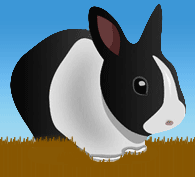Rabbit Common Health Problems
Diarrhoea:-Diarrhoea in rabbits can be a cause for concern as rabbits go down hill very quickly and need to be re-hydrated. Rabbits that are stressed or have a change in diet could be prone to diarrhoea. If it is a diet change i.e. due to vegetables or fruit that the rabbit is not used to eating, or a change of dried food, I usually find 2 to 3 syringes of natural yoghurt with the good bio cultures twice a day (or more if necessary) does the trick. This is putting the good bacteria back into the rabbitís digestive system.
You canít overdose on yoghurt so donít worry if you think youíve given too much. You can also get a probiotic from your vet (I use Biolapis) which can be put into the rabbits water bottle. This can also help if your rabbit has been on antibiotics as that can also upset the rabbits gut.
If you rabbit does have diarrhoea then youíll need to clean him/her and any bedding area to prevent flies (flystrike) and also keep the rabbit warm. If you can bring your rabbit indoors then thatís even better.
ImportantÖ
If the diarrhoea hasnít cleared up within 24 hours or if your rabbit is between 0-14 weeks of age or is lethargic you must see your vet immediately for treatment.
In the mean time encourage your rabbit to eat good quality hay.
Dribbling:-Usually when a rabbit dribbles or has continuously mucky or runny eyes it is a tooth problem. You may also find your rabbit is having trouble eating certain foods and is losing weight.
Tooth problems are common in rabbits as most are of a genetic origin. Whether you buy from a pet shop or breeder, or from rescue centres you can never tell if your rabbit will have teeth problems. Usually, rescue centres will have an idea if there is a problem and will try to help.
If the front teeth (incisors) are long and over grown then you can either have them clipped or removed. I would have them removed as I feel having teeth clipped every 8 weeks or so can be stressful for the rabbit. Some rabbits need to have an anaesthetic when their teeth are clipped which can be costly and itís not good for the rabbit to be going under a general anaesthetic every couple of months or so. Having them removed is one cost and only one anaesthetic. I have two rabbits of my own with no front teeth. They can still eat their dried food (Science Selective) and vegetables. Instead of giving whole carrots give peelings and cut up the greens and they can manage quite easily.
Back teeth (molars) canít be removed and sometimes have spurs on them. These can be managed with a good file down (when they are under anaesthetic to have their front ones removed). Then a file down occasionally there after.
Top and bottom molars grind down the food and grind against each other so hopefully wouldn't need as much attention as the front incisors.
Sore Hocks:-Some rabbits are prone to sore hocks which can be a recurring problem. For example, Rex rabbits have very little fur on their feet to protect them from the hutch floor. Rabbits that are kept on wire mesh could also have this problem. Usually, the first sign that your rabbit has sore hocks is some blood on the floor where the rabbit has been. You may find your rabbitís feet are ulcerated and bleeding.
You need to keep the feet clean and apply a healing cream. You may need to get a special type of cream from your vet and get them to dress the feet for you if necessary. You would need the dressing changed every few days depending upon the severity of the wounds. If the wounds are not bleeding then you could apply Sudocrem and perhaps some baby socks to help absorb the cream into the feet.
You can also help by keeping the rabbit on grass or Megasorb in their hutch which is a soft bedding to help prevent rubbing on the wood.
Overweight or large breeds of rabbit can also suffer with this problem.
Bloat:-This condition is caused when the stomach fills up with gas. The rabbit will be reluctant to move and the stomach will feel swollen and hard.
To help prevent this condition it needs plenty of coarse fibre in the diet. Plenty of hay and grass as well as vegetables. Too much dry food and treats with little or no hay is not good for the rabbit.
If your rabbit has bloat it must be seen by a vet immediately for teatment. It may need intensive care for 3-4 days with fluids and force feeding. If left unattended it will prove fatal for the rabbit.
Pineapple juice and gentle massage to the abdomen to move the gas can also help.
Abscess:-This is a swelling on the body that is filled with pus. Usually the rabbit remains well and eating.
Abscessís are caused by infection usually from another rabbit bite due to fighting, or tooth roots where the root has grown up into the jaw bone.
Sometimes abscessís can be removed with surgery or they can be lanced and drained. Abscessís can be treated with antibiotics but sometimes it is not possible to cure an abscess being treated long term with just antibiotics and draining.
Aggression:-Aggression can be perceived as a behavioural problem where the rabbit is grunting and pouncing at you. They can become territorial of their hutch and their food bowl - particularly females. The female can get very hormonal and start attacking you or other rabbits that may be housed together.
This type of aggression is usually solved with neutering / spaying. Spaying also reduces the risk of unwanted litters and uterine tumours in older rabbits which are quite common.
Rabbits are best picked up from above the body and firmly. They cannot see too well from the front so to suddenly see your hand may make it bite you in defense.
Males may still fight after neuturing and cannot be put back together as a pair. Once testosterone has kicked in they will fight with each other sometimes resulting in horrific injuries.
The best pairing is usually a neutered male and spayed female. Rabbits are best when they are out in the garden in the run where they can happily munch on grass and play all day. A rabbit that is left in the hutch all day with just a bowl of food and no handling can become very unhappy and aggressive.
Flystrike:-Flystrike is an infestation of maggots around the back end of the rabbit. This is most common in the hot, humid weather of summer.
If your rabbit is over weight then it cannot turn around and clean his/herself properly therefore attracting flies to their rear end. You should check you rabbit daily for any soiled rear end and back legs and if necessary wash your rabbit. You must also keep your hutch cleaned, disinfected regularly and well ventillated.
You can talk to your vet about various products you can buy to help prevent flystrike. The best way for me though is not to let a rabbit get over weight. If you have an over weight rabbit, cut down on the dry commercial food and feed only a small amount of this once a day.
Let your rabbit feed on grass / hay and fresh fruit and vegetables and get plenty of exercise. | |
|



